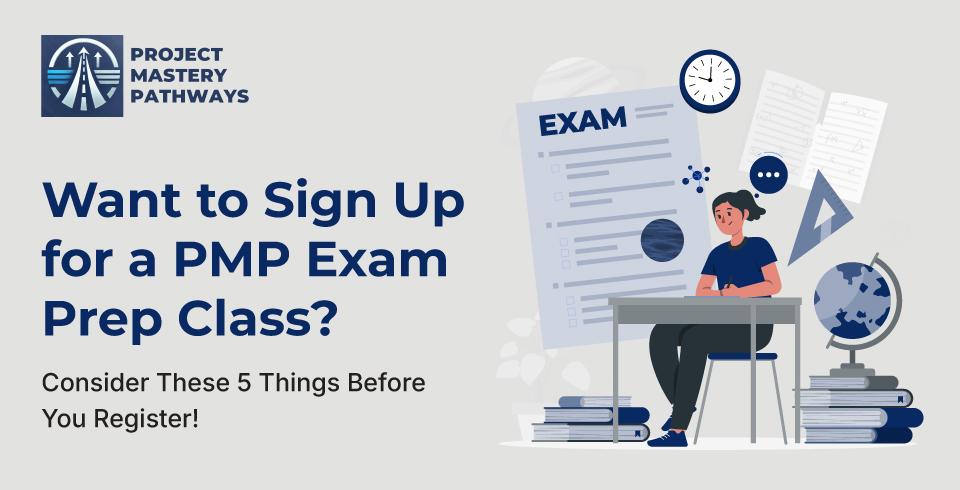Picture this: You’ve decided to pursue your PMP certification, and you’re scrolling through dozens of PMP exam prep class options online. Each one promises guaranteed success, comprehensive coverage, and the best instructors in the industry. But here’s the problem—with so many choices and varying price points, how do you know which PMP exam prep class will actually deliver on its promises and give you the best chance of passing your exam on the first attempt?
Choosing the wrong PMP exam prep class can cost you more than just money. It can lead to inadequate preparation, wasted time, and ultimately, exam failure that delays your career advancement by months. The stakes are high, and the decision deserves careful consideration. The good news is that by evaluating five critical factors before enrolling, you can confidently select a PMP exam prep class that aligns with your learning style, schedule, and career goals, setting yourself up for certification success.
1. Verify the Training Provider’s Credentials and PMI Approval
The first and most crucial factor when selecting a PMP exam prep class is ensuring the training provider is a PMI Registered Education Provider (R.E.P.). This designation means the Project Management Institute has vetted the organization and approved their curriculum to meet PMP certification requirements.
Why R.E.P. Status Matters:
- Only R.E.P. providers can issue the 35 PDUs (Professional Development Units) required for PMP exam eligibility
- R.E.P. courses follow PMI’s quality standards and cover all exam domains comprehensively
- Non-R.E.P. training may leave gaps in your preparation or fail to meet eligibility requirements
Don’t just take the provider’s word for it—verify their R.E.P. status directly on PMI’s website. Some providers may claim PMI approval without actually holding R.E.P. credentials. Additionally, research the instructor’s qualifications. Look for trainers who hold current PMP certifications and have real-world project management experience, not just academic knowledge.
Understanding What is PMP Certification helps you appreciate why proper credentialing matters so much in this field. The certification’s value lies partly in its rigorous standards, which begin with your preparation phase.
2. Evaluate the Curriculum Coverage and Teaching Methodology
Not all PMP exam prep classes are created equal. The best programs cover all three exam domains—People (42%), Process (50%), and Business Environment (8%)—with appropriate time allocation and depth.
Essential Curriculum Components:
- Comprehensive Domain Coverage: Ensure the class addresses traditional, agile, and hybrid project management approaches
- Practical Application: Look for programs that include case studies, real-world scenarios, and hands-on exercises
- Current Content: Verify that materials reflect the latest PMBOK Guide 7th Edition and current exam format
- Practice Questions: Quality programs include extensive practice questions and mock exams
The teaching methodology should match your learning style. Some students thrive in interactive live sessions, while others prefer self-paced online modules. Consider whether you need visual aids, group discussions, or one-on-one support. Programs that offer multiple learning formats provide flexibility for different preferences and schedules.
Many candidates ask about PMBOK 6th vs 7th Edition for PMP Exam preparation. Ensure your chosen class uses current materials that align with the principle-based approach of the 7th edition.
3. Assess Class Format, Schedule, and Flexibility Options
Your PMP exam prep class should fit your lifestyle, not disrupt it. Consider the various format options and their implications for your learning experience and schedule.
Format Considerations:
- In-Person Classes: Offer direct interaction and networking opportunities but require fixed schedules and travel
- Live Virtual Sessions: Provide real-time interaction with instructors while offering location flexibility
- Self-Paced Online: Allow maximum flexibility but require strong self-discipline and motivation
- Hybrid Options: Combine multiple formats for balanced learning experiences
Evaluate the total time commitment realistically. Most comprehensive PMP exam prep classes require 35-40 hours of instruction time, but factor in additional study time, homework, and practice exams. Some programs spread this over several weeks, while others offer intensive weekend formats.
Consider your work schedule, family commitments, and personal learning preferences. If you’re a busy professional, a self-paced online program might work better than fixed evening classes. However, if you need accountability and structure, scheduled live sessions might be more effective.
4. Investigate Practice Materials and Exam Simulation Quality
The quality of practice materials often determines your exam success more than the instruction itself. Your PMP exam prep class should provide extensive practice opportunities that simulate the actual exam experience.

Quality Practice Components:
- Question Bank Size: Look for programs offering 1,000+ practice questions covering all exam domains
- Realistic Difficulty Level: Questions should match the complexity and style of actual PMP exam questions
- Detailed Explanations: Each answer should include comprehensive explanations for both correct and incorrect options
- Mock Exams: Full-length practice tests that mirror the actual exam format and timing
Understanding How Long is the PMP Exam helps you appreciate why time management practice is crucial. Quality prep classes include timed practice sessions that help you develop the stamina and pacing needed for the 230-minute exam.
Pay attention to whether practice questions focus on situational judgment rather than simple memorization. The current PMP exam emphasizes applying knowledge to solve problems, not just recalling facts. Your prep class should reflect this emphasis in its practice materials.
5. Compare Pricing, Value, and Post-Class Support
While cost shouldn’t be the only factor, it’s important to understand what you’re paying for and ensure you’re getting good value for your investment.
Pricing Considerations:
- Total Investment: Factor in course fees, materials, and any additional costs
- Value Comparison: Compare features, support, and success rates across different providers
- Hidden Costs: Watch for additional fees for materials, practice exams, or retake support
Don’t automatically assume the most expensive option is the best, or that the cheapest will save you money in the long run. Focus on value—what combination of features, support, and success rate gives you the best chance of passing your exam on the first attempt?
Post-Class Support Evaluation:
- Instructor Access: How long can you contact instructors with questions after class completion?
- Material Access: Do you retain access to online materials, recordings, and practice questions?
- Retake Policies: What support is provided if you need to retake the exam?
- Community Access: Are there alumni groups or ongoing learning communities?
Understanding PMP Exam Cost and Retake Cost helps put the training investment in perspective. A quality prep class that helps you pass on the first attempt can actually save money compared to cheaper alternatives that lead to retakes.
Make an Informed Decision for Your PMP Success
Selecting the right PMP exam prep class is a crucial investment in your project management career. By carefully evaluating credentials, curriculum, format, practice materials, and value, you can choose a program that maximizes your chances of first-attempt success while fitting your lifestyle and budget.
Remember, the goal isn’t just to find any PMP exam prep class—it’s to find the one that sets you up for long-term success in project management. Consider factors like Which Certification is Best for Project Management to ensure your chosen path aligns with your career objectives.
Ready to make an informed decision about your PMP preparation? Visit my YouTube channel PMPwithRay for detailed reviews of different preparation approaches and insider tips on what to look for in quality PMP training programs. If you’re looking for a comprehensive, well-structured PMP exam prep class that checks all the boxes discussed in this guide, explore my PMP Certification Exam 35 PDU Training course on Udemy. This program combines expert instruction, extensive practice materials, and ongoing support to give you the best chance of PMP certification success on your first attempt.

